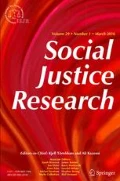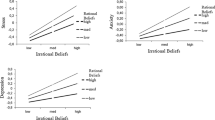Abstract
Research shows that strong believers in a just world respond with less negative and more positive emotion to their own negative outcomes than do weak believers. The present study investigated mediators of this relation. We proposed that strong believers in a just world (versus weak believers) would make stronger internal and weaker external attributions for their negative outcomes, leading to reduced perceived unfairness, which, in turn, was expected to lead to less negative and more positive emotion. We assessed the just world beliefs of a sample of undergraduates as well as measuring their cognitive and emotional responses to an exam grade. Mediational analyses showed that our data were consistent with the processes proposed above. Various cognitive and motivational interpretations of the present findings are discussed
Similar content being viewed by others

REFERENCES
Adams, J. S. (1965). Inequity in social exchange. In Berkowitz, L. (ed.), Advances in Experimental Social Psychology (Vol. 2), Academic Press, New York, pp. 267–299.
Bandura, A., Reese, L., and Adams, N. E. (1982). Microanalysis of action and fear arousal as a function of differential levels of perceived self-efficacy. J. Pers. Soc. Psychol. 43: 5–21.
Baron, R. M., and Kenny, D. A. (1986). The moderator-mediator variable distinction in social psychological research: Conceptual, strategic, and statistical considerations. J. Pers. Soc. Psychol. 51: 1173–1182.
Bentler, P. M. (1989). EQS: Structural Equations Program Manual. BMDP Statistical Software, Inc., University of California, Los Angeles.
Bentler, P. M. (1992). On the fit of models to covariances and methodology to the Bulletin. Psychol. Bull. 112: 400–404.
Bies, R. J. (1987). The predicament of injustice: The management of moral outrage. In Cummings, L. L., and Staw, B. M. (eds.), Research in Organizational Behavior (Vol. 9), JAI Press, Greenwich, CT, pp. 289–319.
Byrne, B. M. (1994). Structural Equation Modeling with EQS and EQS/Windows. Sage, Thousand Oaks, CA.
Carver, C. S., DeGregorio, E., and Gillis, R. (1980). Ego-defensive attribution among two categories of observers. Pers. Soc. Psychol. Bull. 6: 44–50.
Clewes, J. L., and Endler, N. S. (1994). State-trait anxiety and the experience of elective surgery in children. Can. J. Behav. Sci. 26: 183–198.
Dalbert, C. (1993). Gefährdung des Wohlbefindens durch Arbeitsplatzunsicherheit: Eine Analyse der Einflußfaktoren Selbstwert und Gerechte-Welt-Glaube. Zeitschrift für Gesundheitpsychologie 4: 294–310.
Dalbert, C. (1998). Belief in a just world, well-being, and coping with an unjust fate. In Montada, L., and Lerner, M. J. (eds.), Responses to Victimization and Belief in a Just World, Plenum, New York, pp. 87–105.
Davis, M. H., and Stephan, W. G. (1980). Attributions for exam performance. J. Appl. Soc. Psychol. 10: 235–248.
Ekman, P. (1984). Expression and the nature of emotion. In Scherer, K. S., and Ekman, P. (eds.), Approaches to Emotion. Erlbaum, Hillsdale, NJ, pp. 319–343.
Epstein, S. (1984). Controversial issues in emotion theory. In Shaver, P. (ed.), Review of Personality and Social Psychology (Vol. 5), Sage, Beverly Hills, CA, pp. 64–88.
Feather, N. T. (1992). An attributional and value analysis of deservingness in success and failure situations. Br. J. Soc. Psychol. 31: 125–145.
Festinger, L. (1957). A Theory of Cognitive Dissonance, Stanford University Press, Palo Alto, CA.
Fiske, S. T., and Taylor, S. E. (1991). Social Cognition, McGraw-Hill, New York.
Frazier, P. A. (1990). Victim attributions and post-rape trauma. J. Pers. Soc. Psychol. 59: 298–304.
Furnham, A. (1998). Measuring the beliefs in a just world. In Montada, L., and Lerner, M. J. (eds.), Responses to Victimization and Belief in a Just World, Plenum, New York, pp. 141–162.
Furnham, A., and Procter, E. (1989). Belief in a just world: Review and critique of the individual difference literature. Br. J. Soc. Psychol. 28: 365–384.
Garret, J., and Libby, W. L. (1973). Role of intentionality in mediating responses to inequity in the dyad. J. Pers. Soc. Psychol. 28: 21–27.
Greenberg, J. (1994). Using socially fair treatment to promote acceptance of a work site smoking ban. J. Appl. Psychol. 79: 288–297.
Hafer, C. L., and Olson, J. M. (1989). Beliefs in a just world and reactions to personal deprivation. J. Pers. 57: 799–823.
Hafer, C. L., and Olson, J. M. (1993). Beliefs in a just world, discontent, and assertive actions by working women. Pers. Soc. Psychol. Bull. 19: 30–38.
Hafer, C. L., and Olson, J. M. (1998). Individual differences in the belief in a just world and responses to personal misfortune. In Montada, L., and Lerner, M. J. (eds.), Responses to Victimization and Belief in a Just World, Plenum, New York, pp. 65–86.
Janoff Bulman, R., and Wortman, C. B. (1977). Attributions of blame and coping in the “real world”: Severe accident victims react to their lot. J. Pers. Soc. Psychol. 35: 351–363.
Lazarus, R. S. (1991). Emotion and Adaptation, Oxford University Press, New York.
Lefcourt, H. M., Miller, R. S., Ware, E. E., and Sherk, D. (1981). Locus of control as a modifier of the relationship between stressors and moods. J. Pers. Soc. Psychol. 41: 357–369.
Lerner, M. J. (1970). The desire for justice and reactions to victims. In Maccaulay, J., and Berkowitz, L. (eds.), Altruism and Helping Behavior, Academic Press, New York, pp. 205–229.
Lerner, M. J. (1977). The justice motive: Some hypotheses as to its origins and forms. J. Pers. 45: 1–52.
Lerner, M. J. (1980). The Belief in a Just World: A Fundamental Delusion, Plenum, New York.
Lerner, M. J., and Miller, D. T. (1978). Just world research and the attribution process: Looking back and ahead. Psychol. Bull. 85: 1030–1051.
Lerner, M. J., and Sommers, D. G. (1992). Employees' reactions to an anticipated plant closure: The influence of positive illusions. In Montada, L., Filipp, S., and Lerner, M. (eds.), Life Crises and Experiences of Loss in Adulthood, Erlbaum, Hillsdale, NJ, pp. 229–253.
Lind, E. A., and Tyler, T. R. (1988). The Social Psychology of Procedural Justice, Plenum Press, New York.
Lipkus, I. (1991). The construction and preliminary validation of a global belief in a just world scale and the exploratory analysis of the multidimensional belief in a just world scale. Pers. Ind. Diff. 12: 1171–1178.
Lipkus, I. M., and Bissonnette, V. L. (1996). Relationships among belief in a just world, willingness to accommodate, and marital well-being. Pers. Soc. Psychol. Bull. 22: 1043–1056.
Lipkus, I. M., Dalbert, C., and Siegler, I. C. (1996). The importance of distinguishing the belief in a just world for self versus for others: Implications for psychological well-being. Pers. Soc. Psychol. Bull. 22: 666–677.
Mikula, G. (1986). The experience of injustice: Toward a better understanding of its phenomenology. In Bierhoff, H. W., Cohen, R. L., and Greenberg, J. (eds.), Justice in Social Relations, Plenum Press, New York, pp. 103–124.
Miller, D. T., and Ross, M. (1975). Self-serving biases in the attribution of casaulity: Fact or fiction? Psychol. Bull. 82: 213–225.
Montada, L. (1994). Injustice in harm and loss. Soc. Just. Res. 7: 5–28.
Olson, J. M., and Hafer, C. L. (1996). Affect, motivation, and cognition in relative deprivation research. In Sorrentino, R. M., and Higgins, E. T. (eds.), Handbook of Motivation and Cognition (Vol. 3), Guilford Press, New York, pp. 85–117.
Olson, J. M., Roese, N. J., and Zanna, M. P. (1996). Expectancies. In Higgins, E. T., and Kruglanski, A. W. (eds.), Social Psychology: Handbook of Basic Principles, Guilford Press, New York, pp. 211–238.
Paulhus, D. (1983). Sphere-specific measures of perceived control. J. Pers. Soc. Psychol. 44: 1253–1265.
Reichle, B., Schneider, A., and Montada, L. (1998). How do observers of victimization preserve their belief in a just world cognitively or actionally? Findings from a longitudinal study. In Montada, L., and Lerner, M. J. (eds.), Responses to Victimization and Belief in a Just World, Plenum Press, New York, pp. 55–64.
Ritter, C., Benson, D. E., and Snyder, C. (1990). Belief in a just world and depression. Sociolog. Pers. 33: 235–252.
Rubin, Z., and Peplau, L. A. (1973). Belief in a just world and reactions to another's lot: A study of participants in the national draft lottery. J. Soc. Iss. 29: 73–93.
Rubin, Z., and Peplau, L. A. (1975). Who believes in a just world? J. Soc. Iss. 31: 65–89.
Shaver, P., Schwartz, J., Kirson, D., and O'Connor, C. (1987). Emotion knowledge: Further exploration of a prototype approach. J. Pers. Soc. Psychol. 52: 1061–1086.
Smith, R. H., Parrott, W. G., Ozer, D., and Moniz, A. (1994). Subjective injustice and inferiority as predictors of hostile and depressive feelings in envy. Pers. Soc. Psychol. Bull. 20: 705–711.
Taylor, S. E., and Brown, J. D. (1988). Illusion and well-being: A social psychological perspective on mental health. Psychol. Bull. 103: 193–210.
Tomaka, J., and Blascovich, J. (1994). Effects of justice beliefs on cognitive appraisal of and subjective, physiological, and behavioral responses to potential stress. J. Pers. Soc. Psychol. 67: 732–740.
Trevino, L. K., and Ball, G. A. (1992). The social implications of punishing unethical behavior: Observers' cognitive and affective reactions. J. Management 18: 751–768.
Walster, E., Berscheid, E., and Walster, G. W. (1976). New directions in equity research. In Berkowitz, L., and Walster, E. (eds.), Advances in Experimental Social Psychology (Vol. 9), Academic Press, New York, pp. 1–42.
Zuckerman, M., Gerbasi, K. C., Kravitz, R. I., and Wheeler, I. (1975). The belief in a just world and reactions to innocent victims. JSAS Cat. Sel. Doc. Psychol. 5: 326.
Author information
Authors and Affiliations
Corresponding author
Rights and permissions
About this article
Cite this article
Hafer, C.L., Correy, B.L. Mediators of the Relation Between Beliefs in a Just World and Emotional Responses to Negative Outcomes. Social Justice Research 12, 189–204 (1999). https://doi.org/10.1023/A:1022144317302
Issue Date:
DOI: https://doi.org/10.1023/A:1022144317302



